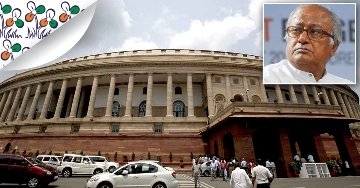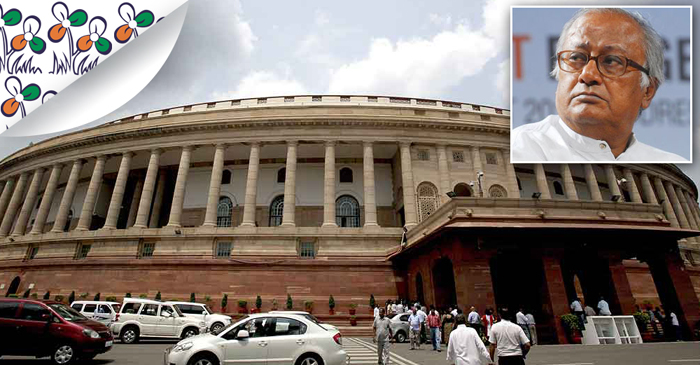Sir, let me state at the outset that as a Member of this House I do not appreciate the way in which the Bill was brought. The rule is that you always bring a Bill before the Business Advisory Committee. The Business Advisory Committee allocates time and then we discuss the Bill. Without going to the Business Advisory Committee to bring a Bill to the House is not proper. I wanted to point that out to you but you did not let me. But anyway, put it on record.
I heard the Finance Minister on why he has to bring the Bill. In the morning the talk was that the Joint Committee of both Houses will be formed. Shri Sudip Bandyopadhyay on behalf of our party even gave the names of our proposed representatives. But after that the Government turned and did a flip-flop. They said that they will discuss the Bill and pass it, if not today, tomorrow.
This is not the way a legislation, and such an important legislation particularly, should be passed. The Finance Minister expressed his frustration with the way legislations may be processed. I appreciate that as Finance Minister, he has committed to the nation that he will get the GST Bill passed. Somehow or other, we passed the Bill. The Government has a clear majority. But they could not get it passed in the other House. Now, it is not our problem or our fault if the ruling party does not have a majority in the Rajya Sabha.
I think that politically, they should take the reality into consideration before they bring revolutionary Bills. They do not have a majority in the present bicameral system. They have to find a way, but the way Mr. Jaitley has found, I think, is not proper. Ultimately, politics consists of reaching out and convincing people. However intransigent, we talk with rebel groups in the country. Why can the Government not reach out and talk to the opposition parties and find a solution? After all, they are the ruling party, they are the Ministers. The responsibility is solely theirs, but I find a problem with this.
The Finance Minister is quite right. He talked of tea parties that took place at various places, but we, in the Parliament, are not aware of this. It was never reported that they have tried these, these tricks. We only learn from the newspapers that such and such person had a tea party with such and such person. Is this the way a legislation should be placed? You are an experienced parliamentarian, Sir. You please consider.
May I say that we have in the story books a story of doing something on the rebound? Say, a boy is in love with a girl or a girl is in love with a boy. Then, the girl rejects the boy. Then, what happens? On the rebound, the boy goes and marries some other girl. This is called an action on the rebound.
It seems to be that Mr. Jaitley takes actions on the rebound. The first thing he did after losing the Bihar elections is that he went and announced FDI for many items. He told me that day that I have a problem with FDI. I have no problem with FDI. All I want to say is that I have a problem with the way Mr. Jaitley is trying to introduce FDI. Every different item of FDI should be separately scrutinized, before you take a decision. At one go, you do not announce FDI, which is what Mr. Jaitley said. Especially I remember Shrimati Sushma Swaraj’s speech against FDI in retail. I do not know how, after that, there is a total flip flop by the Government on FDI.
Our State also welcomes FDI, if brought in the proper sectors, but our party does not approve of FDI in defence, to which the Finance Minister seems committed. So, securing a political point against a minor person like me – you do not question my bona fide about FDI – is not done.
Again, Mr. Jaitley has done another act on the rebound like that jilted lover. The day he learned that Goods and Services Tax Bill will not be passed in Rajya Sabha, he went ahead and brought this Insolvency and Bankruptcy Code. I read statements from his Economic Affairs Secretary. He says that this is the most important reform-based legislation after GST. You have not got the best, so you are choosing for the second best. We could not pass the GST, so you have brought the Insolvency and Bankruptcy Code.
It seems that you have done this on the rebound. Otherwise, why should it be done in a hurry? Why there is confusion, I do not know. This is the feeling I have about the Bill. Sir, you are an experienced parliamentarian. On the last but one day of Parliament, they come out with a Bill which has 252 clauses, which seeks to amend 11 different Acts – Income Tax Act; Customs Act; Central Excise Act; SARFAESI; Debt Recovery Tribunal Act, Company Law, etc. This is being done with one Bill, being passed after two hours discussion, as per your idea. It seeks to amend 11 Acts. Strangely, it is called a Code, but technically how can it be called a ‘Code’? Why because in a Code, all the other Bills will have to be repealed.
He has not repealed any Act excepting one. So, this is also not a proper Code, if I may say so. Now, as I said, all of us did not get enough time to study the Bill. Still, we did not fly away from the responsibility of speaking on this Bill. Again, I refer to another weakness of Lawyer-Ministers of all times. When Mr. Kapil Sibal was the HRD Minister, he brought in a large number of legislation on education like Right to Education Act, Foreign Educational Institutions Bill, etc. Excepting one, none of the other Bills were passed, though they were placed in Parliament. Mr. Jaitley is going in the lawyer’s way of bringing in legislation when none is needed.
We studied in the Standing Committee on Finance the Benami Transactions Bill. It was the considered opinion of the Members, which we will give in a report later, that it was not necessary to bring in that Bill. They felt that the Income Tax Act, 1961 could have been suitably amended to cover the aspects in Benami Transactions Bill. He also brought a Bill relating to foreign black-money, in order to bring in black-money from abroad. I do not know, apart from creating fear in the minds of many, what that Bill seeks to achieve.
As we have repeatedly said, the Prime Minister’s promise of bringing back black-money stashed in foreign shores remains an unfulfilled dream. The common man waits in hope, looking at the sky, as to when Rs. 15 lakh that are supposed to be put in his account will fructify. Mr. Jaitley is good at drafting the Bills. He is good at bringing them to the House, but I have certain points on which I need clarifications. As I said, we came back to Delhi on Sunday night.
I was told that this Bill with 252 clauses was supplied to us on Saturday morning in our Delhi address. We are in the House throughout yesterday and also today. At 5.00 p.m. we are told that this huge Bill is coming. Now, I want to ask the Finance Minister a few simple questions.
I do not know why he calls it major reforms legislation. In fact, he is not doing anything which will encourage investment further. He has brought a Bill dealing with companies which are closed or on the verge of being closed or going into liquidation or on the verge of going into liquidation. I do not know how it is a big reforms Bill. How it will bring more investment to India etc. Now, let us study one or two aspects.
As a trade union person, having associated with the fate of many companies which were closed down, what did we do? When the creditors were pressing the company, the company got closed one day. In our State, the rule is that you have to give two months’ notice. They gave the two months’ notice. But the statutory dues of the workers remained pending. So, the creditors went to the High Court and obtained an order to appoint a Liquidator.
An Official Liquidator was appointed and this Official Liquidator then started the process of selling off the assets of the company. The priority was listed. We always pleaded in the High Court – though we are not lawyers but through our lawyers – to please give the priority to the workers’ preference. Workers have a lot of demand. But this process was not entirely unworkable. I will say that in many companies, this liquidation proceeding did give some money to the workers. I will give you a famous example.
Long before Sharda, there was a Sanchita Investment case in West Bengal. Sanchita was some sort of a secret chit fund which went burst. Many middle class people had kept money over there. The creditors went to the High Court. A Liquidator was appointed. I know that the Liquidator for five years slowly started paying something to those depositors who had filed an application with him. Ultimately I think, they got 25 per cent or 30 per cent money that they had deposited with Sanchita. As Shri Jaitley claimed that this was not a workable thing, I would say that it was partly a workable thing. He has totally dismissed it.
Maybe, Shri Jaitley may have appeared for liquidation of the subcompany. I do not know on which side. That was a process that was known. Secondly, he talked about the Bureau of Industrial Finance and Reconstruction (BIFR). First, the idea was that if a company loses money for three consecutive years, then they went to a body called the Bureau of Industrial Finance and Reconstruction (BIFR). We, as workers, used to go to the SCOPE Complex to give our deposition to the BIFR. Then they announced a reconstruction. In many cases, even the public sector undertakings were going to the BIFR from 1991 onwards. I will give an example. Shri Jaitley will verify it.
The Bengal Chemical and Pharmaceutical Works is a Government of India company under the Ministry of Chemicals and Fertilizers. It went to the BIFR. The BIFR gave a package. The Central Government gave money. The company is running well. Now they say that the BIFR created a thick screen through which nobody can penetrate.
The idea of the BIFR was and should be that you should reconstruct the company, so ask the State Government to give up some of its sales tax claims, even ask the Centre to give up some of its tax claims, and also in an equitable fashion try to satisfy the creditors so that a future remained for the company. Now, Mr. Jaitley is venturing into uncharted territory when instead of BIFR he suggests a fresh mechanism by which the problem of sick industries will be met. I do not know. Mr. Jaitley like all Governments likes to set up more bodies which will mean more employment and employment to important people. We have a member here. Her husband was a member of the AIFR, the appellate body for the BIFR.
So, Mr. Jaitley is again forming a Board with a lot of power. It will be called Insolvency and Bankruptcy Board of India. How many Boards have been set up by Government of India? BIFR was set up by Government of India. Why do you need more Boards all the time to really sort out the problems? This is increase of the bureaucracy. Sir, I want that some of the members of the Board should be banking professionals. It is not mentioned in the composition of the Board. The basic idea is to how to settle the law with the banks.
Now I come to my next point. Mr. Jaitley has totally said that all this is not working. There was the SARFAESI Act. The full name is very big. The full name is the Securitisation and Reconstruction of Financial Assets and Enforcement of Security Interests Act, 2002. It is known as SARFAESI Act, which again is being subsumed into this Act.
SARFAESI Act came with a new idea. I told you earlier about liquidation. The next process was BIFR. The third is the SARFAESI Act. When a bank was not getting money from the debtor, from the company, then there will be application of the SARFAESI. The bank will get total control. Then what happens is that a new sort of company came into being overnight. These are called asset management companies. They were not there before. They only came into being after SARFAESI Act was enacted. These asset reconstruction companies are going about doing their job in trying to reconstruct the company. The idea is the same. Use the assets so that something can be salvaged and some money can be given.
Now Mr. Jaitley, our hon. Finance Minister, has gone a step further. He said, no, we will have new types of professionals. They are called insolvency professionals, professionals who are experts in winding up companies. And we will have resolution professionals. It is alright you create some employment or some sort of professionals. But my basic idea is that we are again going into a blind alley, a trap in over legislation, in creating too many multiple agencies.
Without going into any of the details, we are going into a situation where more will be at stake. Why are we concerned? That is because in our State there are sick companies. In my Constituency there are any number of sick companies which closed down and we hold the workers’ hands for years together.
We do not want to go further into blind alleys. Lastly, he has talked about a new fund with this Insolvency and Bankruptcy Board of India. His idea, if I understood correctly, is that all the assets should go into the Consolidated Fund of India and then that fund will be transferred to this Board. They will decide on the payment to the different creditors.
My simple question is whether it is only the asset of the closed companies or it is some money that the Government will give to revive sick companies. If that is so, the question remains, there are small fraudsters and there are big fraudsters like Kingfisher. They have siphoned off money from a company and now the company goes into liquidation. Will the Government pay from the Consolidated Fund of India to revive or pay back the fraudsters? So, that question is not quite clear to me from the law as such.
I still want that this Bill should go to the Standing Committee. I am the Member of the present Committee. The last Standing Committee was headed by Shri Yashwant Sinha, one of the most efficient BJP Members and father of our hon. Minister of State for Finance. They gave reports on so many important legislations.
Why has Shri Jaitley, for want of a majority in Raya Sabha, lost faith in the Standing Committee process which has been one of the high marks, one of the bright spots of the Parliamentary system where people sit together and discuss. Shri Nishikant Dubey and Shri Bhartruhari Mahtab agree on points and then proceed on that.
We can only talk of ourselves. Shri Jaitley, you are a big Minister and the leader of the Rajya Sabha. Why are you losing faith? Just for political expediency, please do not destroy or disturb an institution which has been set up. As I mentioned throughout my speech, in his hurry to bring a reform on the rebound, he has gone in for massive 252-clause legislation.
I saw a statement by the Secretary General of CII Shri Chandrajit Banerjee, the only person who has welcomed it, saying how it will improve the ease of doing business in India. These Chambers and Confederations represent only the interest of the corporate classes. I do not know of a single case where any Chamber of Commerce has taken up the case of a single sick industry.
They only think what is profitable for them. So, I do not know whether I can congratulate him, but if Shri Jaitley is satisfied with the certificate of General Secretary of CII that it will improve ease of doing business, good luck to him. May India prosper.



